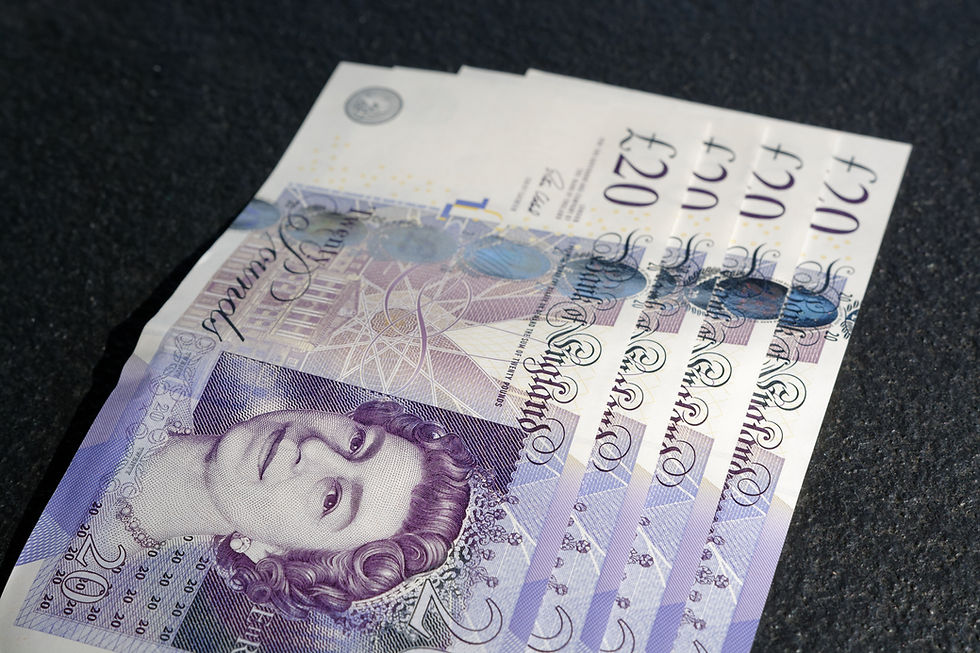Is the lottery tax free?
- Jordan White DipPFS

- Oct 28, 2024
- 5 min read

You don’t pay any tax on lottery winnings in the UK, whether it's the normal lottery, scratch cards or even Euromillions.
Legally classed as gambling, any profits (a win) you make from buying a lottery a ticket are exempt from tax, so the full amount you win is the amount paid to you. So, If you win £1 million on the lottery, £1 million pounds is what lands in your bank account. That means no capital gains tax, income tax or national insurance on lottery winnings.
Interest earned on lottery winnings once it's been paid into your bank account could be subject to income tax.
On death, your lottery winnings could also be subject to tax. Any unspent lottery winnings will form part of your overall estate of money and assets. And whoever inherits your estate might have to pay inheritance tax on some of it.
Gifting lottery winnings to family and friends
When it comes to giving lottery winnings to your family and friends, the rules applied are pretty much the same as any type of money gift. And the main tax implication surrounding money gifts is inheritance tax.
£3000 annual gift allowance
Every tax year (6 April to 5 April), UK citizens can ‘gift’ £3000 without inheritance tax implications. This includes birthday presents or Christmas gifts. So if you gifted somebody a car for Christmas, anything over £3,000 might be subject to inheritance tax at a later stage.
If you don’t use your allowance one year, you can carry it over by 1 year.
So potentially, you can gift up to £6000 in a tax year.
Smaller gifts
On top of the £3000 annual allowance, you can also make smaller gifts up to £250 to as many people as you like. But make sure you’ve not used your £3000 allowance on the same person. So if you've already given £3,000 to your daughter, you can't give another £250 to her in the same tax year.
Example:
You give £3000 to your daughter in tax year 2024/25.
You also give 5 gifts of £250 to your 5 nieces and nephews in the same tax year.
NOTE: You shouldn’t go over the £250 limit as the entire amount will then be liable to possible inheritance tax. So if you make a gift of £300, the whole amount could have a tax implication, not just the £50 over £250.
Wedding gifts
If you have family members getting married, you might like to support them with a gift.
On top of your £3000 annual allowance, there are additional allowances you could use for loved ones getting married.
up to £1,000 per person – cousin, aunt, nephew, for example
£2,500 for a grandchild or great-grandchild
£5,000 for a child
So let’s say your daughter is getting married this year. You could gift her £5000 specifically for her wedding, plus £3000 to use up your main annual allowance.
Payments for a family member’s living costs
While there is no fixed amount on this rule, money gifts to support living costs for a relative may also be exempt from inheritance tax.
This could be a relative under 18 or an elderly relative.
What about gift tax on larger lottery winnings?
A big lottery win can leave you millions of pounds better off.
So you’re probably thinking bigger than a few thousand pounds to gift to family.
How much money can be legally given to a family member as a gift?
There is no limit to how much money you can gift to a family member or friend tax-free in the UK. So, for example, if you gifted a million pounds of lottery winnings to your family, there would be no 'gift tax' on it.
That said, any amount of money gifted that’s above your annual allowances could be subject to inheritance tax at a later point.
The 7 year rule on gifts
If you gift something – money or an asset – it’s legally still classed as part of your estate for 7 years from the date you made the donation.
The reason for this is to prevent people on their death bed gifting away all of their estate to avoid inheritance tax.
Now the issue with a big lottery win is that the value of your estate will go up dramatically, therefore increasing your potential inheritance tax liability.
Example 1:
John is 50. He’s just won £1 million on the lottery. He wants to give his son £50,000 as a gift.
He’s not used any of his annual allowance yet. So £3000 can go directly to his son and is no longer part of John’s estate.
The remaining £47,000 will still be classed as part of John’s estate for the next 7 years. It’s legally known as a Potentially Exempt Gift.
His son can take the money and spend it. But John dies 5 later. So that £47,000 still forms part of this estate when calculating if any inheritance tax is due on John’s estate when he died.
The beneficiaries of John’s estate, which could well be John’s son himself, could then have a tax bill to pay when inheriting the estate.
Example 2:
John gifts £50,000 to his son. £3000 of that comes from his annual gift allowance.
£47,000 is available for John’s son to spend, but is still classed as part of John’s estate for 7 years.
John dies 8 years after gifting the £47,000 to his son.
It is no longer classed as part of John’s estate. So no inheritance tax liability is of concern.
So when it comes to having a lot of money, gifting some of it away early can actually make sense if you want to avoid a big inheritance tax bill.
So when it comes to giving away lottery winnings to your family, there is really no limit to what you can give. The issue of tax is what you really need to think about.
Anything over the annual allowances or outside exemptions will still remain be part of your estate for 7 years, therefore contributing to the calculation of any inheritance tax owed.
Summary
Lottery winnings are tax-free at the point of receiving them. You could pay savings tax on interest earned or your estate could be subject to inheritance tax.
You can share your lottery winnings with family and friends, or give to charity, without you or them paying tax on it at the time of giving. Any winnings gifted could be subject to inheritance based on the 7 year rule on gifts.
If you're looking for financial planning support for a lump sum of money, get in touch with a financial adviser such as myself.







Good day viewers, I wish to share my testimony with all of you. I have daily 9 to 5 jobs, but while I work, I try my luck at playing instant Lotto. On this particular day, I decided to seek help online regarding tips for winning the lottery, and I saw many individuals testifying about Meduza spells. I reached out to him and informed him that I needed help to win the lottery, and he clarified the process to me, stating that after he casts the spell, it will take 48 hours for him to provide me the winning numbers, which I accepted. I followed all his instructions, and he provided me with the numbers to enter the Lottery. After…
I've been attempting to expand my wine business in my hometown in White Plains. For the past 7 years, I do play the lottery in my spare time, but on this blessed day I came across an article about Lord Meduza's spell to win the lottery. I contacted Lord Meduza to see if it would work and after I agreed to his terms and conditions for completing the task for me, he performed his magical powers for me and within 48 hours, he provided me with the numbers I needed to play the lottery, and I followed his directions. I found out at the store that I was the winner of a $105 million jackpot. For a moment I felt…
It might look hard or impossible to win the lottery when all you do is just go to the shop and play whatever comes to your mind without directions. Well, I will tell you now, my friend, it doesn't work that way. There are many ways to win the lottery fast and reliably, and one of them is through spells. i know a lot of people are scared to try spells because of the rate of scam on the Internet, but i won the 40 Million Lotto Max jackpot with spell, I'm Elizabeth Trafford, my winning story is not a secret and you can do some research on it, i want whosoever that has been playing the lottery without winning…
My name is Charles Coffey, I’m 81 years old and proud to be an Officer of the Order of Canada. I’ve always stood for good causes, but nothing prepared me for the sadness I felt after playing Lotto Max for years with no win. My wife begged me to stop wasting money it broke my heart. One day, while browsing online, I found stories about Lord Bubuza helping people win the lottery. I contacted him on WhatsApp, and he kindly told me what to do. Two hours after he cast his spell, he gave me 7 numbers and a bonus. I played them and I won $1,000,000. I was in shock. Lord Bubuza gave me joy and hope when I…
My name is Charles Coffey, I’m 81 years old and proud to be an Officer of the Order of Canada. I’ve always stood for good causes, but nothing prepared me for the sadness I felt after playing Lotto Max for years with no win. My wife begged me to stop wasting money it broke my heart. One day, while browsing online, I found stories about Lord Bubuza helping people win the lottery. I contacted him on WhatsApp, and he kindly told me what to do. Two hours after he cast his spell, he gave me 7 numbers and a bonus. I played them and I won $1,000,000. I was in shock. Lord Bubuza gave me joy and hope when I…